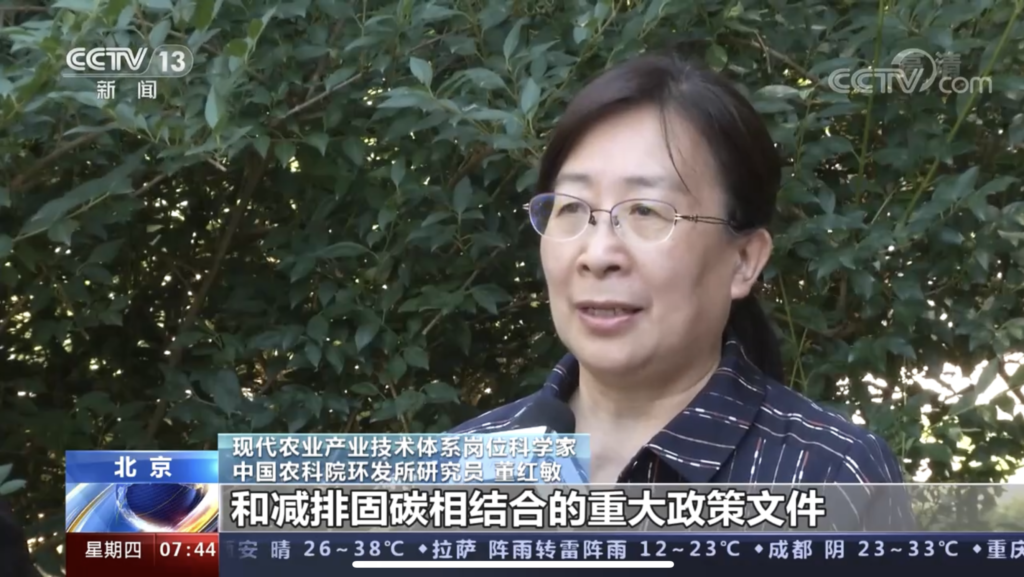In 2020, China committed to achieving carbon peaking by 2030 and carbon neutrality by 2060. Against this backdrop, on 1 July 2022, NDRC (National Development and Reform Commission) and MARA (Ministry of Agriculture and Rural Affairs) jointly released an action plan aimed at reducing carbon emissions in agriculture and rural areas. The document follows on the heels of China’s first-ever green agricultural development plan released in September 2021, further specifying how to reduce carbon emissions from the agricultural sector. It is not only highly significant for China’s climate mitigation and adaptation efforts, but also for the acceleration of agricultural modernization, rural revitalization, and the promotion of a rural ecological civilization.
By 2025, based on the systematic integration of agriculture and rural carbon emission reduction, food security, and rural revitalization, this plan intends to build a low-carbon development model for the agriculture sector in which carbon emissions in crop and livestock farming will be reduced and the carbon sequestration capacity of crop farming will be intensified.
By 2030, on the basis of coordinated action in agricultural carbon reduction and food security, rural revitalization, and agricultural modernization, carbon emissions from crop and animal farming will be further reduced and agriculture’s carbon sequestration capacity will be further strengthened, marking the successful transition of agriculture and rural development into a green direction.
Crop farming: On the basis of ensuring food security, irrigation management in rice paddies will be optimized and methane emissions from rice paddies will be reduced. Improvements in the efficiency of nitrogen fertilizers will help reduce nitrous oxide emissions.
Livestock farming: Precision feeding technology will be promoted to increase the feed conversion rate of livestock and poultry and reduce methane emissions from cattle. Better manure management practices will help recycle more livestock and poultry manure and reduce greenhouse gas emissions from animal waste.
Fishery: Integrated rice and fish farming will be promoted, reducing methane emissions. The development of tidal zones and shallow sea shellfish algae cultivation will be promoted. The plan also proposes to construct national marine fish farms, build a three-dimensional ecological breeding system, and increase the carbon sink potential of fisheries. Other measures focus on energy saving in fishing and emission reductions from fishing boats.
Carbon sequestration: To improve agriculture’s carbon sequestration capacity, the plan vows to boost agricultural straw recycling, expand the use of organic fertilizer, and intensify the construction of high-quality farmland. China’s black soil areas will receive more protection, while the carbon retention capacity of fruit and tea plantations is to be improved.
Energy-saving agricultural machinery: Replacing old, inefficient agri-machinery equipment with energy-saving machinery is intended to reduce carbon emissions from fossil fuel use. Renewable energy: The plan will promote solar, wind, and geo-thermal energy as sources of power in rural areas.
The plan also proposes ten major actions:
- Reducing methane emissions from rice farming
- Reducing the use of fertilizers
- Reducing carbon emissions from livestock and poultry production
- Reducing carbon emissions from fishery activities
- Advancing energy-saving agricultural practices
- Improving the carbon sequestration capacity of agricultural land
- Reusing and recycling of straw
- Promoting renewable sources of energy
- Promoting technology and innovation solutions for the reduction of carbon emissions
- Establishing an inspection mechanism to monitor carbon emission reduction and sequestration efforts
After the release of the document, Chinese Central Television CCTV broadcast a news story about the plan in their morning show on 1 July. The CCTV news story featured our long-time cooperation partner, Prof. Dong Hongmin of the Chinese Academy of Agricultural Science, praising the significance of the plan and mentioning her relevant work on the topic.
Prof. Dong traveled to Germany on a study tour organized by DCZ in 2019 and was involved in co-organizing several hybrid workshops with DCZ on animal manure utilization in 2021. During her study tour and co-organized workshops, Prof. Dong has exchanged many valuable ideas and practices with German scientists, practitioners, and agri-business professionals with regards to carbon emissions from animal farming with the curtesy of DCZ.
References:
- 农业农村部、国家发展改革委联合印发《农业农村减排固碳实施方案》, http://www.gov.cn/xinwen/2022-07/01/content_5698717.htm, accessed 01 July 2022.
- 农业农村部,《农业农村减排固碳实施方案》, http://www.moa.gov.cn/govpublic/KJJYS/202206/P020220630331656855638.pdf,
accessed 01 July 2022.





